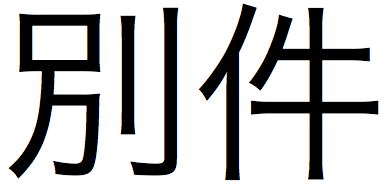The new guy at work is a loud talker, and he often powwows with the guy in the office next to mine, which has been a huge boon for my I Heard That strategy. It’s difficult to tell exactly what they’re talking about, but I do get the drift of some conversations, and it’s impossible not to take in (at least subconsciously) the rhythm of the language.
I caught a great piece of language the other day. The two of them had been talking about something and then the loud talker said 全然別件なんですが to change the subject.
This is a great little phrase, one that I would categorize as a type of Airbag Phrase. The original Airbag Phrases help cushion requests, but on their most basic level they act as preparatory transitions that help the listener understand what is going to happen next in the conversation. I always feel like a Jedi when I use them: These aren’t the droids you’re looking for.
別件 (べっけん) is a nice compound that follows the Na-nominal + Noun pattern: 別 a separate 件 topic.
Readers should recognize 全然 (ぜんぜん) as an adverb that usually precedes negative adjectives and verbs and implies “not ____ at all” or “completely not ____”: 全然おもしろくない (not interesting at all), 全然おいしくない (not delicious at all), etc.
In casual situations, 全然 gets attached to positive adjectives and verbs to express a good totality: 全然大丈夫 (totally okay), 全然平気 (completely fine), etc. When I was studying abroad, one of my Japanese friends told me that she knew my Japanese was getting good because I used 全然 in this context. It sounds very natural but is relatively casual, so I’d recommend not using it with superiors. Loud talker happens to be the superior to the guy in the office next to mine, so it works out okay, but I doubt that he would use it with his own boss.
In this case 全然 gets attached to 別件 to imply how drastically different the next conversation topic is. I think this is an especially useful phrase for Japanese as a Second Language students; phrases like this will make your speaking seem more natural and less like surrealist poetry, jumping willy nilly from one topic to the next.

